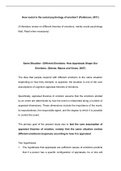How social is the social psychology of emotion? (Parkinson, 2011)
(A literature review on different theories of emotions, mainly social psychology
field. Read when necessary)
Same Situation—Different Emotions: How Appraisals Shape Our
Emotions. (Siemer, Mauss and Gross, 2007)
The idea that people respond with different emotions to the same situation
depending on how they interpret, or appraise, the situation is one of the core
assumptions of cognitive appraisal theories of emotions.
Specifically, appraisal theories of emotion assume that the emotions elicited
by an event are determined by how the event is interpreted along a number of
appraisal dimensions. These dimensions include the importance of the event,
its expectedness, the responsible agent, and the degree to which it is possible
to control the event.
The primary goal of the present study was to test the core assumption of
appraisal theories of emotion, namely that the same situation evokes
different emotional responses according to how it is appraised.
Two hypotheses:
1 The hypothesis that appraisals are sufficient causes of emotions predicts
that if a person has a specific configuration of appraisals, he or she will
, have a specific emotional response. Thus, different emotional reactions
should be predictable by different appraisal patterns of the situation
across participants.
2 The necessity hypothesis predicts that if a person shows a specific
emotional response, this response has been caused by (and requires) a
specific appraisal pattern. Thus, to test the necessity hypothesis, we
examined whether different emotional response profiles were associated
with distinct appraisal patterns.
(The author provided literature reviews, pick articles when necessary)
Discussion:
1 Our results showed that individual emotional reactions were determined
by how people appraised the situation, thereby supporting a core
assumption of cognitive appraisal theories of emotions: People respond
with different emotions to the same situations depending on how they
appraise the situation.
2 Across all participants, distinct emotions were differentially associated
with and predictable by different appraisal patterns. This pattern of results
supports the assumption that different appraisal patterns of the same
situation are sufficient to cause different emotional reactions (sufficient
version supported).
3 The findings showed that the diverse emotional response profiles were
predictable and largely determined by the reported appraisals of the
situation (support necessity version).
4 This literature convincingly shows that voluntary changes of the
appraisals of a situation can efficiently influence the intensity of an
emotional reaction (Gross, 1998; Ochsner, Bunge, Gross, & Gabrieli,
2002; Ochsner et al., 2004).
5 Noncognitive emotion regulation strategies, such as inhibition of emotion
expressions, have been consistently found to be less efficient, if effective
, at all, to change the intensity of emotions (Gross, 1998; Gross &
Levenson, 1997).
6 Appraisal theories typically assume that appraisals not only influence the
emotion-intensity but also determine the quality of an emotion (e.g.,
Ortony et al., 1988).
, The sufficiency and necessity of appraisals for negative emotions
(Tong, 2010)
The main purpose of this study was to examine the sufficiency and necessity
of appraisal configurations, focusing on anger, sadness, fear, and guilt.
Four single appraisals were examined for each emotion.
The single appraisals were Pleasantness (the extent to which the emotional
event was appraised as pleasant versus unpleasant), Control-Self (the extent
to which the event seemed controllable by the self), Predictability (the extent
to which it could be predicted how the future would unfold), Obstacles (the
extent to which the event was appraised as involving obstacles to goals),
Fairness (how fair versus unfair the event seemed), Responsibility-Self (the
extent to which the event was appraised as caused by the self),
Responsibility-Others (the extent to which the event was appraised as
caused by someone else), and Exert (how much effort was needed to deal
with the event).
Discussion
1 This study produces the first indications that appraisal configurations,
combinations of single appraisals that appraisal theories predict to be
most associated with emotions, are not sufficient or necessary for
emotions.
2 It replicates past studies in showing that single appraisals are neither
sufficient nor necessary for emotions.
3 Emotion-appraisal relationships should be viewed as probabilistic
relationships, meaning that appraisal and emotions co-occur but one does
not imply the other.
4 This study has considerable methodological strengths.




